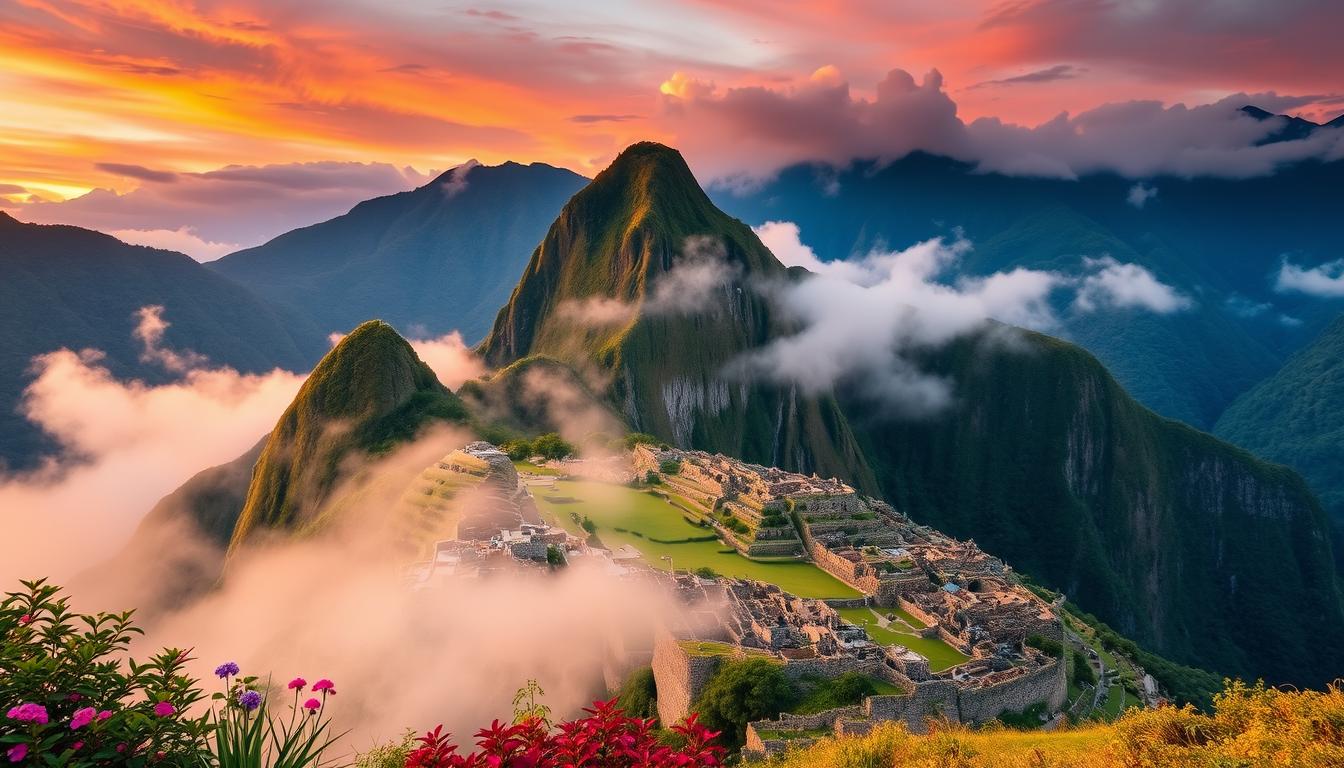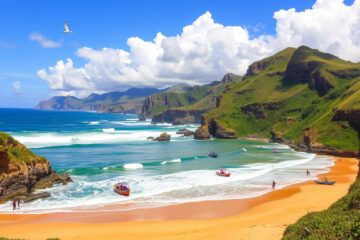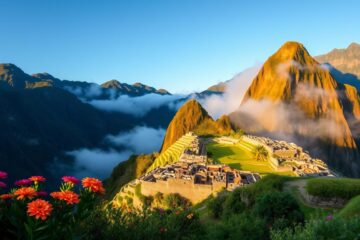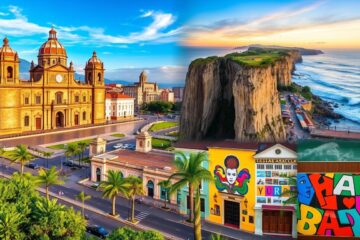Cusco, once the Inca Empire’s capital, is nestled at 3,200 meters. It’s a mix of ancient Inca and colonial Spanish styles. When you arrive, take it easy for a few days to get used to the high altitude.
Coca tea, found at most hotels, can ease the effects of altitude sickness. Cusco is a key spot for visiting Machu Picchu and other sites in the Sacred Valley. Its historical center, a UNESCO World Heritage Site, blends Inca and colonial designs.
Key Takeaways
- Cusco, the former Inca capital, offers a unique blend of ancient and colonial architecture.
- Visitors should acclimatize to the high altitude and utilize coca tea to combat altitude sickness.
- Cusco serves as a gateway to Machu Picchu and the Sacred Valley, renowned for their archaeological wonders.
- Cusco’s historical center is a UNESCO World Heritage Site, showcasing Inca and colonial influences.
- The city provides a captivating experience for history and culture enthusiasts.
Explore the Magnificent Machu Picchu
Visiting Machu Picchu is a must when in the Cusco region of Peru. This ancient Inca citadel sits on a mountain and can be reached by the famous Inca Trail or a scenic train. The Classic Inca Trail is a 4-day trek that lets you dive into Inca history and see stunning Andean views.
For a more relaxed trip, you can take a day trip from Cusco to Machu Picchu. No matter the route, standing in the Inca ruins and seeing the views is awe-inspiring. You can explore the site, learn about the Inca architecture, and discover the history of this amazing civilization.
Trek the Inca Trail
The Inca Trail is a famous trek that takes you through the Andes to Machu Picchu. It’s a challenging journey that mixes beautiful scenery with Inca history and culture. Along the way, you’ll see ancient ruins, mountain passes, and cloud forests, ending at Machu Picchu.
Visit the Ancient Citadel
Visiting Machu Picchu is a transformative experience. The ruins, set against the Andes, show the Inca’s engineering and spiritual beliefs. You can explore sites like the Temple of the Sun and the Royal Quarters, marveling at the stonework and how it fits into the landscape.
Learn About Inca History
Exploring Machu Picchu lets you dive into the Inca Empire’s history and culture. Guided tours and exhibits share insights into the site’s construction, purpose, and downfall. You’ll learn about the Inca’s farming, roads, and spiritual practices, deepening your appreciation for this civilization.
“Machu Picchu is one of those rare and truly spectacular sights that manages to exceed even the highest of expectations. The scale, the setting, the history – it all comes together to create a profoundly moving experience that will stay with you long after you’ve left.”
Immerse Yourself in Cusco’s Rich Culture
Cusco, once the Inca Empire’s capital, mixes ancient history with modern culture. As you explore, dive into the cultural experiences that make Cusco special.
Visit Qorikancha (Temple of the Sun)
Begin at Qorikancha, the Temple of the Sun. This Inca site was once covered in gold. The Spanish built a church on it, but you can still see the Inca stonework. The entry fee is 15 Soles, and it’s closed on Sundays.
Explore the San Blas Neighborhood
The San Blas neighborhood is a few blocks from the main square. It shows off Cusco’s artistic and culinary side. The streets are lined with galleries, cafes, and top restaurants. It’s a place where you can meet local artists and feel the community’s energy.
Exploring Cusco’s culture means trying local food, visiting markets, and talking to the people. Cusco’s mix of Inca and modern life will make your visit unforgettable.
Discover the Sacred Valley
The Sacred Valley of Peru is a treasure trove of Inca history and beauty. It sits in the Andes, with elevations from 6,730 to 9,800 feet. Visitors can dive into Peru’s rich culture here.
Visit Ollantaytambo
Ollantaytambo is a highlight of Cusco day trips. It’s a town with stunning Inca ruins overlooking the valley. You can see the well-kept Inca architecture and some of the oldest homes in South America.
Experience the Maras Salt Mines
The Maras Salt Mines are a must-see. Workers have been making salt here for centuries. The terraced salt pools are a sight to behold, showing the region’s ingenuity.
Explore Pisac Market
A trip to the Sacred Valley isn’t complete without Pisac Market. Here, you can see local crafts, textiles, and fresh produce. It’s a place where you can feel the region’s vibrant culture and art.
| Attraction | Highlights | Average Cost |
|---|---|---|
| Ollantaytambo Ruins | Impressive Inca architecture, well-preserved town | Included in Cusco Boleto Turistico (S/130 / $34 USD) |
| Maras Salt Mines | Terraced salt pools, traditional harvesting methods | S/7 ($1.8 USD) admission |
| Pisac Market | Colorful local crafts, textiles, and fresh produce | Free to explore |
The Sacred Valley is full of Cusco day trips and tours. It lets visitors explore the area’s history, culture, and natural beauty.
Enjoy the Gastronomy of Cusco
Cusco, the ancient capital of the Inca Empire, is a food lover’s dream. The city’s culinary scene is vibrant, with traditional Peruvian dishes and international flavors. Visit local markets like San Pedro Market to taste the flavors that make Cusco’s food so famous.
Try Traditional Dishes
Cusco’s food is deeply rooted in Andean traditions. You must try anticuchos (skewered grilled beef heart), adobo (pork stew), chicharrón (crispy pork belly), and ceviche (raw fish in citrus juices). Don’t miss the local favorite, cuy (roasted guinea pig).
Take a Cooking Class
Learn the art of Peruvian cooking in Cusco. Expert chefs will teach you how to make dishes like ceviche and aji de gallina (creamy chicken stew). These classes are not just about cooking; they also share the cultural traditions of Cusco’s food.
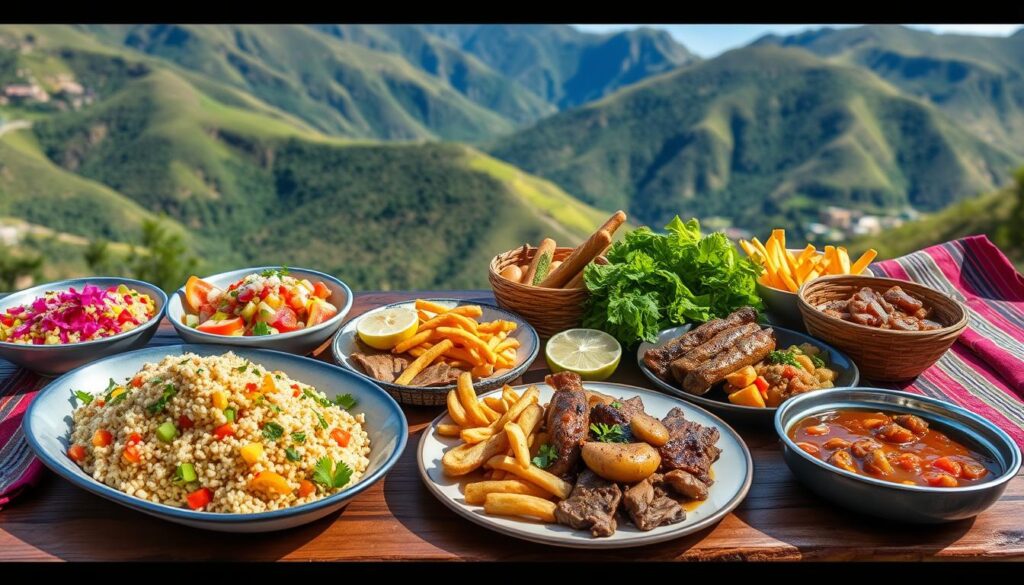
“Cusco’s culinary scene is a vibrant tapestry of flavors, reflecting the city’s rich history and cultural diversity. Discover the soul of Peruvian cuisine and embark on a gastronomic adventure that will tantalize your taste buds.”
Whether you’re enjoying a traditional meal or taking a cooking class, Cusco’s gastronomy is an unforgettable experience. It will leave a lasting mark on your taste buds and memories.
Visit the Imposing Sacsayhuamán Fortress
The Sacsayhuamán ruins sit atop hills north of Cusco. They are a key spot for those exploring Cusco’s ancient sites. Built in the 15th century, this fortress is famous for its huge stone walls. These walls show the Inca’s skill in engineering.
Learn About the Inca Architecture
The stones at Sacsayhuamán are massive, some over 125 tons. They fit together perfectly, without mortar. The site has three main gateways, each showing a different stage of its history.
Enjoy Scenic Views of Cusco
Sacsayhuamán is at 3,700 meters (12,000 feet) above sea level. It offers stunning views of Cusco. Visitors can explore its paths and terraces, amazed by the Inca’s engineering.
The dry season (April to October) is the best time to visit. The climate is mild and dry all year. To get there, buy a Cusco Tourist Ticket. It costs 130 soles (about $46 USD) and lasts 10 days.
“Sacsayhuamán is a marvel of Inca engineering, showcasing the remarkable technical and organizational capabilities of this ancient civilization.”
Experience Cusco’s Vibrant Markets
Dive into the lively world of Cusco’s local markets. Here, you’ll find the essence of this Andean city. From the historic San Pedro Market to the charming artisan stalls, these places offer a unique peek into Cusco’s culture and shopping.
San Pedro Market
The San Pedro Market, built in 1925 by Gustave Eiffel, is Cusco’s first and most famous market. It’s a lively spot filled with exotic fruits, traditional dishes, handcrafted souvenirs, and colorful textiles. As you wander, you’ll meet friendly vendors and enjoy the sights, sounds, and smells that make this market unforgettable.
Visit Local Artisan Markets
Cusco has more than just the San Pedro Market. It’s home to various local artisan markets. Visit places like Isa Luna and Pushka for trendy clothing and accessories that mix Incan and modern styles. These markets are great for finding unique, handmade items and supporting Cusco’s talented artisans.
“The markets of Cusco are a feast for the senses, where the vibrant colors, lively energy, and local flavors come together to create an unforgettable cultural experience.”
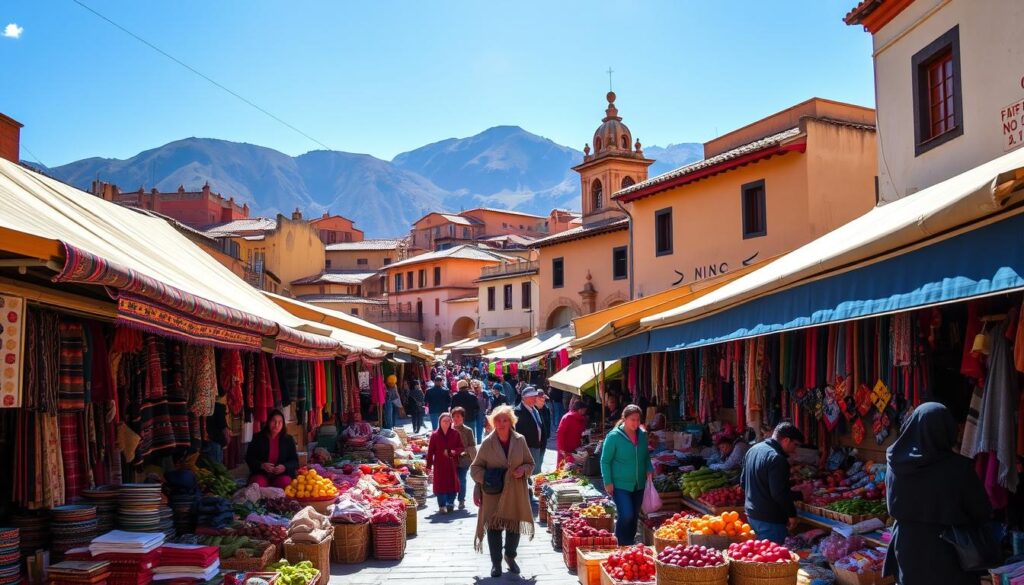
Looking for local treats, traditional textiles, or special souvenirs? Cusco’s markets are the place to be. Spend your time exploring and enjoying the unique atmosphere. It’s a key part of the Cusco experience.
Discover the Historical Sites in Cusco
Cusco’s historical center is a mix of Inca and colonial architecture. It shows the city’s rich history. The Plaza de Armas, the main square, is surrounded by important buildings. These include the famous Cusco Cathedral and the Church of the Society of Jesus.
Plaza de Armas
The Plaza de Armas is Cusco’s central square. It’s bordered by the impressive Cusco Cathedral. The cathedral, finished in 1654, has a great collection of colonial art.
Visitors can walk along Hatun Rumiyoc Street. It’s famous for its twelve-angled stone, from an ancient Inca palace wall.
Cathedral of Cusco
The Cusco Cathedral was built between 1560 and 1654. It’s a beautiful example of colonial architecture. Inside, there’s a lot of colonial art, like altars, paintings, and sculptures.
People can see the cathedral’s stone carvings and its ornate facade. It shows how Inca and Spanish designs came together.
La Merced Church
The La Merced Church is in the heart of Cusco’s historical center. It’s a 17th-century building with a stunning baroque facade. It has a lot of colonial-era art and religious items.
Visitors can see the detailed carvings, painted ceilings, and ornate altars. These show the amazing skill of the time.
“Cusco’s historical center is a captivating blend of Inca and colonial architecture, offering visitors a glimpse into the city’s rich past.”
Unwind in Scenic Natural Areas
Cusco is not just about history and culture. It also has stunning natural landscapes for a peaceful break. Must-see spots include the Parque Arqueológico de Tambomachay and the famous Cristo Blanco viewpoint.
Relax in the Parque Arqueológico de Tambomachay
The Parque Arqueológico de Tambomachay is part of the “4 Ruins” circuit, just north of Cusco. It’s famous for its detailed water systems. The Incas used it for water rituals and relaxation.
Walk through the ruins and admire the fountains. Feel the calm of this Cusco nature spot.
Enjoy the Views from Cristo Blanco
For amazing views of Cusco, visit the Christ the White statue, or Cristo Blanco. It’s on a hill overlooking the city. This spot offers a great scenic viewpoint of the Inca capital and the Andean mountains.
The sunset is the best time to go. The valley glows golden, making it unforgettable.
“Cusco’s scenic natural areas offer a peaceful respite from the bustling city, allowing visitors to connect with the region’s stunning landscapes and rich cultural heritage.”
Looking for peace, stunning views, or a deeper Inca experience? Cusco’s natural wonders are the perfect setting for your adventures.
Participate in Local Festivals
Cusco, Peru, is a lively place filled with culture. The city hosts many festivals and celebrations all year. The Inti Raymi Festival and the Cusco Carnival are two big events that show off Cusco’s traditions.
Inti Raymi Festival
The Inti Raymi, or Festival of the Sun, is a major event in Cusco. It happens every June 24th. This festival brings back ancient Inca ceremonies to honor the sun god, Inti.
Thousands of people come to see the parades, dances, and costumes. The festival ends at Sacsayhuamán, where they reenact the Inca sun worship.
Cusco’s Carnival Celebrations
Cusco’s Carnival, or “Carnavales Cusqueños,” mixes Spanish and Andean cultures. It takes place in February or March. The Carnival has parades, music, and dances like the Diablada and the Morenada.
Visitors can join in the fun, enter costume contests, and try local foods. It’s a big part of the celebration.
